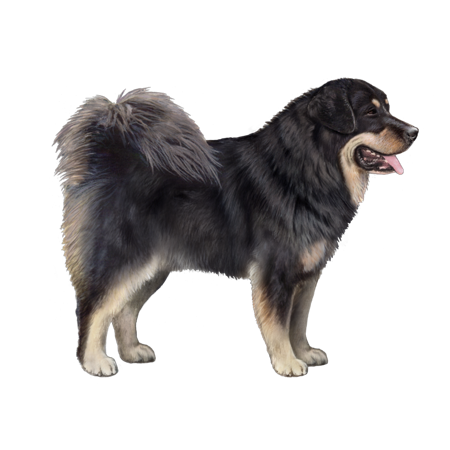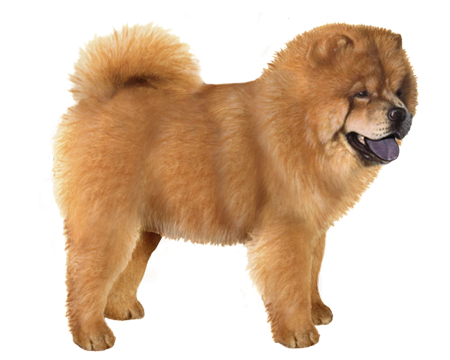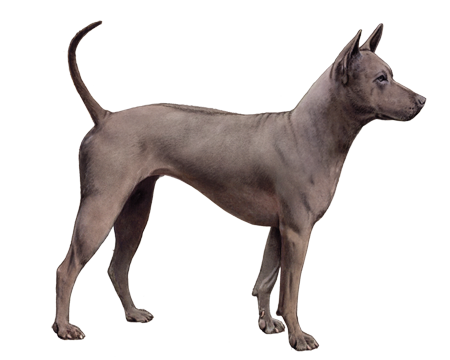
Tibetan Mastiff (Hequ Type)
Strong and protective, Hequ Tibetan Mastiffs have served as devoted guard dogs in the mountains of Tibet for centuries.
Interested in discovering if your dog is a Tibetan Mastiff (Hequ Type)?
Check out Wisdom Panel's DNA tests.

Tibetan Mastiff (Hequ Type) Traits
General Appearance
Hequ Tibetan Mastiffs are large dogs with strong, balanced, fine-boned bodies.
Coat and Colouring
The Hequ's thick double coat can be long or short. Short, soft hair covers the head and ears, and longer hair forms a mane around the shoulders. These dogs typically come in black and golden or black and tan. On black and tan dogs, the tan markings are usually very light. So, the coat is often described as black with silver markings.
Distinctive Physical Traits
This breed has a broad head with a substantial back skull, deep-set, almond-shaped eyes, and a full, square muzzle. Compared to other Tibetan Mastiffs, the Hequ has smaller ears. Their tails are well-feathered and curl over their backs.
Tibetan Mastiff (Hequ Type) Temperament
Hequ Tibetan Mastiffs are fiercely protective of their families but often wary of strangers. They can also be independent, strong-willed, and territorial. Because they tend to bark, they're a better fit for rural life (where they won't annoy nearby neighbors).
Though these pups are devoted to their owners, they're not always overly affectionate. They may also be possessive of food or toys. So, early socialization and proper introductions to other animals, children, and unfamiliar guests are essential.


Tibetan Mastiff (Hequ Type) History
The Hequ Tibetan Mastiff is one of several subtypes of the ancient Tibetan Mastiff. Of all the subtypes, the Hequ is most closely related to the aboriginal Tibetan Mastiff. As the name suggests, this breed originated in an area of Tibet called Hequ—near the junction point of the Qinghai, Gansu, and Sichuan provinces.
Hequ Tibetan Mastiffs remained isolated in the Himalayan Mountains for thousands of years, evolving naturally in their environment. They worked alongside nomadic livestock farmers guarding tents and providing protection from wolves, snow leopards, and other predators.
As a result of their isolation, the Hequ—like Tibetan Mastiffs in general—is a rare breed.
Tibetan Mastiff (Hequ Type) Care
Nutrition
These dogs thrive on a high-quality diet formulated for their life stage and large size. Large breed puppy foods help prevent them from growing too fast—which is important for the proper development of strong, healthy bones and joints. This may also decrease the likelihood or severity of several developmental bone and joint (orthopedic) diseases common in large breed dogs, such as hip and elbow dysplasia.
In spite of their great size, Hequ Tibetan Mastiffs don't have big appetites. Still, it's wise to keep an eye on their food intake and limit treats to no more than 10% of their daily calories.
Grooming
During seasonal shedding periods, Hequ Tibetan Mastiffs require almost daily grooming with a de-shedding tool to remove the undercoat. But the rest of the year, a weekly brushing to remove dirt, debris, and tangles is sufficient.
To reduce your pup's chance of ear infections, check their ears regularly and clean them as needed to remove wax build-up and debris. And be sure to trim those nails to prevent them from snagging on things and breaking.
Lastly, good dental hygiene will support your dog's overall health. So, in addition to professional cleanings, establish an at-home dental care program that includes regular teeth brushing and veterinarian-recommended dental chews.
Exercise
This breed requires moderate exercise to stay happy and healthy. And they prefer slow-paced, leashed walks to games of fetch or chase. Better yet, set your pup loose to roam in a large, enclosed area.
Training
Hequ Tibetan Mastiffs are intelligent dogs and quick learners. But they tend to get bored during training sessions and aren't overly motivated by treats or praise. Try to keep training sessions short and engaging so they don't lose interest.
Even when well-trained, these independent pups may not always come when called. As such, it's best to keep them on a leash when they're in unsecured areas.

Breed Group
Asian and Oceanian
The Asian and Oceanian group is comprised of breeds whose origins lie in Asia, which have spread as far as Australia, the islands of the Pacific, and the Arctic. This group is possibly the most ancient of all breed groups and were bred for a variety of purposes, including guarding, hunting, and as draft dogs.






















































